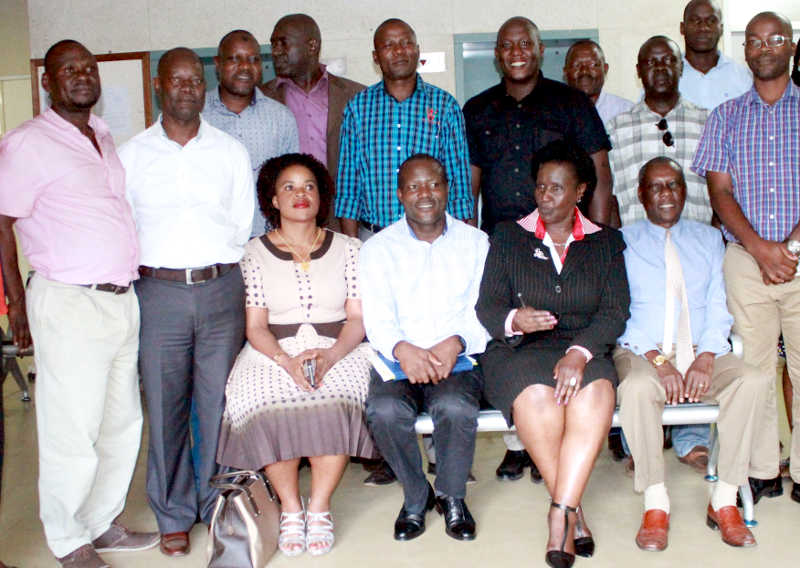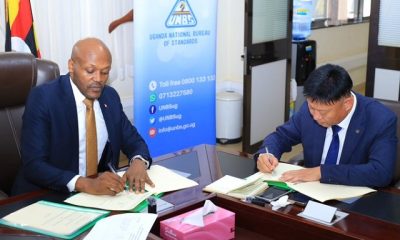Business
Start your own factory
Minister Kyambadde advises cement dealers

Members of Construction Hardware Dealers Association (CHAD) after meeting Minister Kyambadde about the skyrocketing cement prices
The debate about the causes of the recent sharp spike in the price of cement in Uganda has taken an interesting new twist. Local wholesalers are accusing manufacturers of discriminating against them in favour of their Indian competitors.
The local dealers made the stinging accusations last week while meeting with the minister of Trade Industry and Cooperatives Ann Amelia Kyambadde at her office on Parliament Avenue in Kampala.
United under their umbrella body the Construction Hardware Dealers Association (CHADA), the dealers told Kyambadde that they have recently witnessed discriminative practices by cement producers with preference being given to Indians as opposed to indigenous Ugandans.
CHADA’s spokesperson, who is also the Managing Director of Hardware World Simon Ssekankya said: “There is no proper distribution channel for cement. Indians have the monopoly in the cement industry so they are using that advantage to discriminate against us in the distribution of cement. During this period of scarcity, I receive only one truck of cement a day yet some Indian wholesalers receive more than 10 trucks.”
CHADA’s accusations of monopoly tendencies appear to be off the mark as seen from the fact that indeed a number of local dealers are allowed to directly purchase cement from the cement factories.
The current accusations and counter accusations stem from the fact the price of cement has spiked from UGX28,000 late last year to now about UGX40,000 per one 50kg bag of cement.
The sharp increase has not only caused outcry across the country it has far reaching implications on the entire construction industry as well as employment as cement is a major factor in the construction process.
Triggered by the outcry, Minister Kyambadde summoned manufacturers recently who told her that their failure to meet market demand was as a result of unreliable power supply by UMEME which they say causes abrupt shutdown of the machines.
UMEME dismissed the accusation as false and baseless when their spokesperson Stephen Illungole revealed that all the three cement manufacturers have dedicated power lines that are closely monitored to ensure consistent supply.
Minister responds to local cement dealers
In response to accusations of oligopoly practices, Minister Amelia Kyambadde advised the local dealers to unite and establish their own cement factory.
“This is the long-awaited time for you wholesalers put your resources together and start your own cement factory to supplement the 3 existing cement factories and solve the scarcity problem, the monopoly problem and discriminative distribution practices,” said Kyambadde.
She added: “Government will support you to start up a cement factory. Government will avail you with the land in addition to importation of machinery duty free and exemption of corporate tax for 10 years however you must undergo training and attain skills in cement production.”
But the minister’s advice didn’t appear instantly attractive to all the traders as many appeared to push for an end or at least relaxation in Uganda’s restrictions on the importation of cement from other countries.
The dealers indicated that if the government could remove its tight restrictions on the importation of cement, prices would fall as the commodity is cheaper outside the country.
Maria Namusoke of Markh Investments ltd, one of the major cement dealers in Uganda said: “If imported cement is allowed in, it will bring down the cement pricess in Uganda which are higher compared to the neighboring countries even in times of surplus production.”
But Minister Kyambadde insisted that the government has given local cement manufacturers a grace period of 3 weeks within which to stabilize supply and if they fail, the government will swing open the doors to imported cement.
She also promised to work with Uganda Revenue Authority (URA) to fast track the clearance of clinker at the border from Kenya, a major imported raw material used in the production of cement.
The wholesalers also informed Kyambadde that cement manufacturers have denied them contracts that would ensure consistent supply of cement and boost their sales.
In response, Kyambadde urged them to unite and fight for their rights using their association. She also urged them to study and understand the Sale of Goods and Supply of Services Act 2017 that spells out the rights of the buyer in conducting transactions so that they can fight for their rights.
“You need to strengthen your association and have a stronger voice in fighting for your rights,” Kyambadde said.
Comments


















